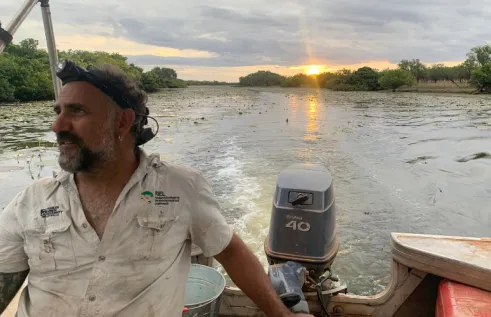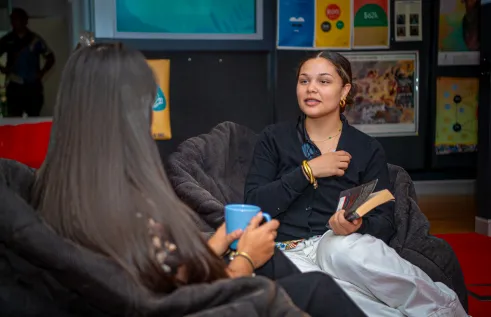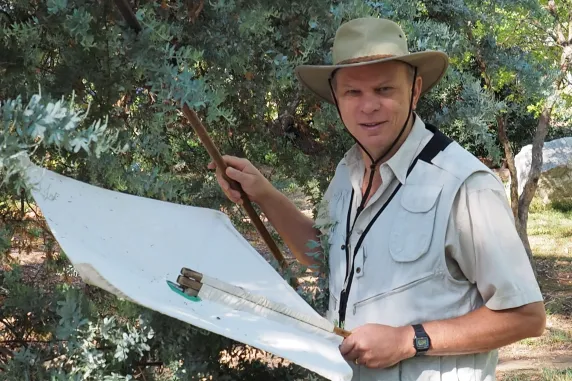RIEL seminar series
Tentegia – the world’s only dung-rolling weevils
| Presenter | Rolf Oberprieler, Hermes Escalona and Debbie Jennings | |
|---|---|---|
| Date/Time |
to
|
|
| Contact person | E: riel.outreach@cdu.edu.au | |
| Location | CDU Casuarina Campus Yellow 1.1.39 and online | |
| Open to | Public | |
While the pre-eminent beetles rolling away the dung of elephants, rhinos and antelopes in the African savanna are the familiar scarabs (subfamily Scarabaeinae), this habit is in fact also practiced by a different group of beetles in Australia, namely weevils. Weevils (family Curculionidae) are one of the most advanced groups of beetles and also one of the most diverse, with more than 60000 species described and about three times as many existing. One of the largest weevil groups in Australia is the tribe Cryptorhynchini, whose larvae mostly bore in dead wood, but one of its many genera, Tentegia, has instead evolved a life history of developing in marsupial dung pellets, which the flightless weevils roll away into caches under logs and into which lay their eggs. There are currently nine described species of Tentegia, the first described as long ago as 1775, and three undescribed ones are known. With half of these species occurring in the N.T., the Territory is the diversity hotspot for these enigmatic dung weevils. Their dung-rolling habit was reported only in 1960 and is still very poorly known, but recent fieldwork in the Undara Volcanic National Park in Queensland has allowed us to film their behaviour for the first time. Much remains to be discovered about this unusual behaviour and its evolution, including why Tentegia are the only dung-rolling weevils in the world.
Rolf Oberprieler is a post-retirement Honorary Fellow at the Australian National Insect Collection of the C.S.I.R.O. in Canberra, where he has worked for the past 25 years on weevil taxonomy. He was born in Hamburg, Germany, but spent his childhood in Namibia (where he discovered his love for beetles) and then specialised on weevils and their taxonomy at the South African National Collection of Insects in Pretoria, South Africa, where he worked for 17 years. He has authored and co-authored more than 260 scientific publications, including a fat checklist of all Australian weevils, a major treatise of the weevils preserved in Burmese amber (recognised as an extinct family) and the last (2020) volume of the Australian Weevils monograph series. His other contributions to weevil systematics span their classification, phylogeny, life histories and associations with particular plants (e.g. cycads). He also has a passion for emperor moths (family Saturniidae) and has published several papers and a book on the African fauna. He continues his research on weevils and moths in retirement but at a more leisurely pace.
Related Events

STATE OF THE DIS-UNION: Media Literacy in the age of AI
The CDU Library is hosting a free panel discussion featuring Northern Territory journalists who will discuss media literacy, truth, and storytelling in the AI era. Attendees can learn how AI is transforming media, ask questions, and improve their understanding of navigating information in today's landscape.
Read more about STATE OF THE DIS-UNION: Media Literacy in the age of AI
Trophic dynamics of free-flowing tropical rivers
Colton Perna's PhD research explores how river flows and flooding shape freshwater fish communities in tropical rivers, using fatty acids to track how hydrology influences food webs and nutritional pathways. His findings highlight the critical importance of river flow and floodplain connectivity in sustaining productive aquatic ecosystems.
Read more about Trophic dynamics of free-flowing tropical rivers
Why Cross‑Cultural Communication Matters in Indigenous-focused Research
A cross‑cultural research partnership grounded in respect, shared knowledge, and educational equity. Discover how collaboration shaped a transformative PhD journey.
Read more about Why Cross‑Cultural Communication Matters in Indigenous-focused Research
